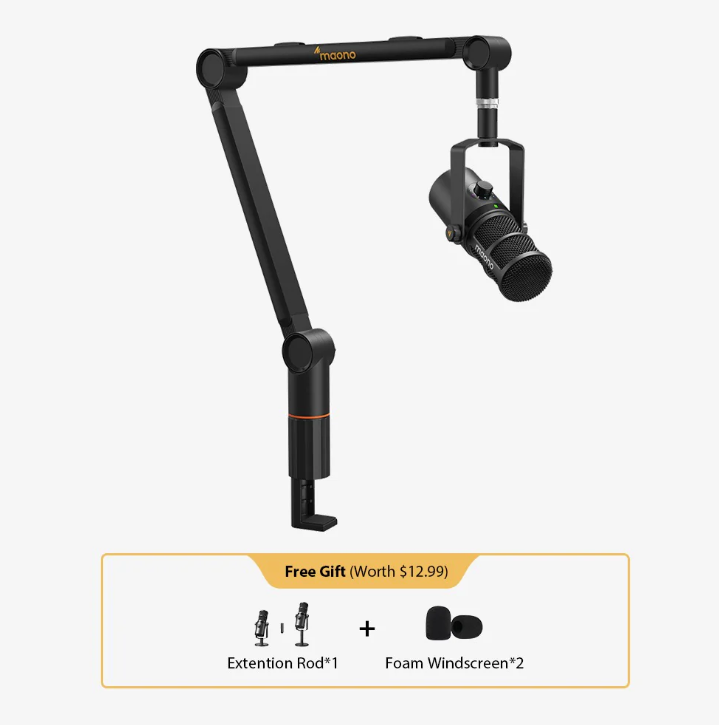Selecting the right microphone for recording vocals, especially singing, is essential to achieving professional-quality audio. Whether you're a musician, podcaster, or content creator, a high-quality singing microphone can make a significant difference in the clarity, warmth, and richness of your voice recordings. When looking for the best singing microphone for recording purposes, there are several factors to consider, including microphone type, polar pattern, frequency response, durability, and budget. Let's explore these factors to help you choose the perfect microphone for your vocal recordings.
Factors to Consider When Choosing a Singing Microphone for Recording
Microphone Type:
Dynamic Microphones: singing mic for recording and recording loud vocals. They are rugged and can handle high SPL (sound pressure level).
Condenser Microphones: Known for their sensitivity and detailed sound reproduction. Condensers are excellent for capturing nuanced vocals and studio recordings.
Polar Pattern:
Cardioid: Most common for vocal recording as it captures sound from the front while minimizing background noise.
Omnidirectional: Captures sound from all directions, suitable for capturing ambient sounds or group vocals.
Figure-8 (Bidirectional): Picks up sound from the front and back but rejects sounds from the sides, useful for duets or interviews.
Frequency Response:
Look for a microphone with a flat or balanced frequency response, especially in the vocal range (typically 80 Hz - 15 kHz).
Some microphones have tailored frequency responses to enhance certain aspects of vocals, such as boosting presence or warmth.
Durability:
Consider the build quality and materials used, especially if the microphone will be used for live performances or frequent travel.
Metal construction and sturdy grilles can ensure longevity and protection against drops and rough handling.
Connection Type:
XLR Connection: Common for professional studio microphones, providing a balanced connection for high-quality audio.
USB Connection: Convenient for direct connection to computers or laptops, suitable for home studios and podcasting.
Budget:
Microphones come in a wide range of prices, from budget-friendly options to high-end professional models.
Consider your budget and the intended use of the microphone. Investing in a quality microphone can yield excellent results for your recordings.
Top Recommendations for Singing Microphones for Recording
Shure SM58 Dynamic Microphone:
Type: Dynamic
Polar Pattern: Cardioid
Frequency Response: 50 Hz - 15 kHz
Known for its durability, clarity, and versatility. A go-to microphone for live vocals and studio recordings.
Audio-Technica AT2020 Condenser Microphone:
Type: Condenser
Polar Pattern: Cardioid
Frequency Response: 20 Hz - 20 kHz
Offers a wide frequency response and detailed sound reproduction. Ideal for studio vocals, podcasts, and acoustic instruments.
Rode NT1-A Condenser Microphone:
Type: Condenser
Polar Pattern: Cardioid
Frequency Response: 20 Hz - 20 kHz
Known for its low self-noise and transparent sound. Great for capturing vocals with clarity and warmth in studio settings.
AKG P220 Condenser Microphone:
Type: Condenser
Polar Pattern: Cardioid
Frequency Response: 20 Hz - 20 kHz
Offers a rugged design with a versatile sound. Suitable for vocals, acoustic instruments, and studio recordings.
Sennheiser e945 Dynamic Microphone:
Type: Dynamic
Polar Pattern: Supercardioid
Frequency Response: 40 Hz - 18 kHz
Designed for live vocals, the e945 provides excellent feedback rejection and clarity for stage performances.
Blue Yeti USB Microphone:
Type: Condenser (USB)
Polar Pattern: Cardioid, Omnidirectional, Bidirectional
Frequency Response: 20 Hz - 20 kHz
A popular choice for home studios and podcasting due to its plug-and-play USB connectivity and versatile polar patterns.
How to Choose the Best Singing Microphone
Consider Your Vocal Style: If you have a powerful voice or perform genres that require dynamic range, a dynamic microphone may suit you. If you need detailed and nuanced recordings, a condenser microphone is ideal.
Test Before Buying: Whenever possible, try out different microphones to see which one complements your voice the best. This can be done at music stores or by borrowing from friends.
Research User Reviews: Read reviews and testimonials from other singers or recording professionals to get insights into the microphone's performance and durability.
Check Compatibility: Ensure the microphone is compatible with your recording setup, whether you need an XLR connection for an audio interface or a USB connection for direct computer recording.
Consider Accessories: Factor in the cost of accessories such as microphone stands, shock mounts, pop filters, and cables when budgeting for your microphone.
Room Acoustics: Keep in mind that the acoustics of your recording space can also affect microphone choice. Consider acoustic treatment or portable vocal booths for improved sound quality.
Conclusion
Selecting the best singing microphone for recording is a crucial decision for any vocalist or content creator. A high-quality microphone can capture the nuances and emotions of your voice, leading to professional-quality recordings. Consider factors such as microphone type, polar pattern, frequency response, durability, and budget when making your choice. Whether you prefer the ruggedness of a dynamic microphone like the Shure SM58 or the clarity of a condenser microphone like the Audio-Technica AT2020, there are options available for every need and budget. With the right microphone, you can elevate your vocal recordings, whether for music, podcasts, voiceovers, or streaming, and deliver impactful performances that resonate with your audience.
For more info. visit us:





Comments